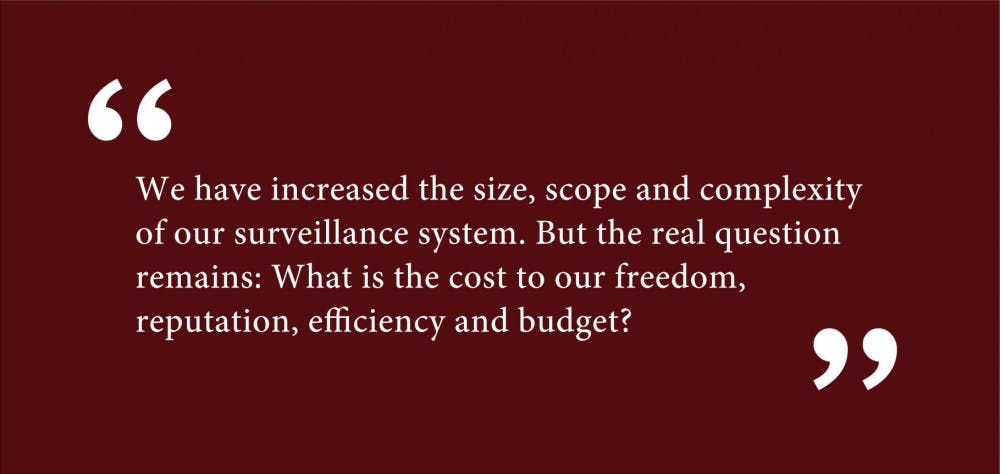In a post-9/11 world, in pursuit of its mission to thwart terrorism in the United States and ensure national security, U.S. intelligence agencies have become larger, more complex and, if possible, even more secretive. There has been no concomitant change in oversight, however, allowing almost imperial power to a community whose operations bear and potentially infringe upon some of our most precious constitutional freedoms. The absence of new checks on these agencies makes daunting the task of determining whether they are crossing crucial lines or taking actions of which the public, were it aware, would disapprove.
In 2010, Washington Post journalists published an investigative series called “Top Secret America” in an attempt to examine this huge and powerful network and concluded that it was inefficient and opaque to both those entrusted with oversight of funding and the people it is meant to protect. While national security and government secrecy should be preeminent, the impact of the “war on terror” may be so intrusive upon our individual liberties as to make its operations unconscionable in a free and democratic society. Finding the correct balance, where to draw the line, is one of the most pressing issues we face.
The evanescence of the enemy at large makes it much more difficult to assess the effectiveness of a project of this scope. Seventeen years after the horrific attacks of 9/11, the most pressing threats are more often portrayed as coming from small cells or lone wolves than from an army of terrorists, hardly comparing to the two-headed menace of Nazi Germany and Imperial Japan. Yet taxpayers’ money is now being consumed at a rate it never had been before: The U.S. Intelligence Budget is up to $57.7 billion, over twice the size it was Sept. 10, 2001. With more and more taxpayer money on the line, it is imperative that this system be tailored to a real threat and then managed transparently and effectually.
Not only have concerns over secrecy caused many intelligence organizations to become ever more clandestine, the lack of shared data has increased redundancy, reduced effectiveness and, in many instances, potentially impacted civil liberties. As just one example, 51 federal organizations and military commands are tasked with tracking the paper trail to and from terrorist networks, and often do not divide the work, but rather produce similar and often overlapping products.
Furthermore, our government has increased its commitment to remaining as secretive as possible. A large study found that “for every dollar the government spent declassifying documents in 2009, it spent $196 million maintaining the secrets already on the books.” Also in 2009, “the U.S. government imposed secrecy orders on 103 new patents,” “the number of closed-door meetings rose to 7,221” and “classified programs accounted for $35 billion, or 16 percent of the Pentagon’s acquisition funding.”
Many government officials see institutional secrecy as necessary, and media projects like “Top Secret America” are considered a destabilizing force. Former Acting Director of National Intelligence David C. Gompert said, “We accept that we operate in an environment that limits the amount of information we can share. However, the fact is, the men and women of the Intelligence Community have improved our operations, thwarted attacks and are achieving untold successes every day.” The reason why the government keeps so much of its intelligence clandestine is because it has to. To counterbalance current risks caused in part by international interventions that some believe to be necessary, we have increased the size, scope and complexity of our surveillance system. But the real question remains: What is the cost to our freedom, reputation, efficiency and budget?
To fix the system, there must be more transparency in our government. Congress, which allocates billions of dollars a year to these networks, could begin sharing information that does not risk national security. In response to Top Secret America, Congress began to act. As former Sen. Kit Bond said: “We can do more to keep our nation safe, and improving Congressional oversight and ensuring the top spy chief has the authority needed to streamline our intelligence community are the first steps.” However, with a deadlocked and inefficient Congress, often too timid to confront internal security issues, it is unlikely we will see the desired change anytime soon. Thus, it falls to the media to continue to push the boundaries and demand positive change.
Emily Miller ’19 can be reached at emily_miller@brown.edu. Please send responses to this opinion to letters@browndailyherald.com and other op-eds to opinions@browndailyherald.com.





